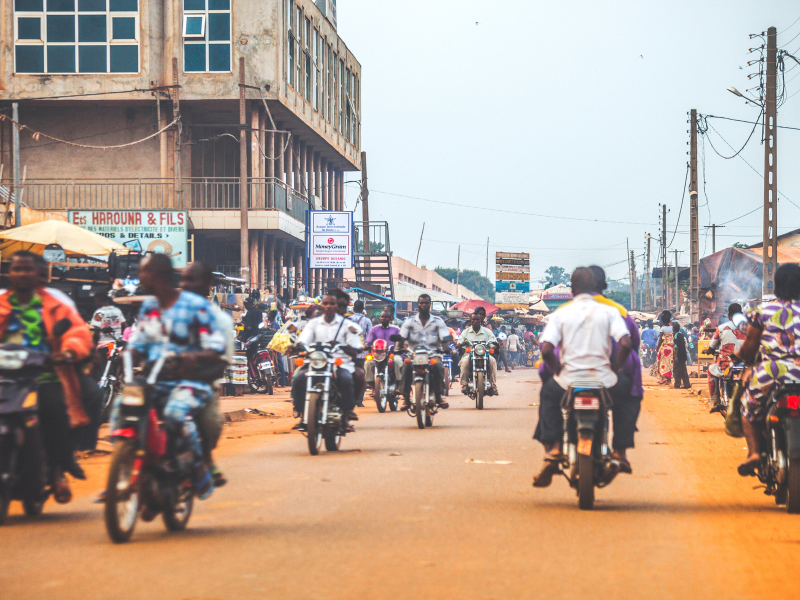Leaders and partners across the continent must prioritize a people-first outlook that explicitly links Africa’s agency with a rekindling of democratic governance.
Op-ed: Africa’s agency in a time of governance disillusionment
March 14, 2024

Motorcycle traffic in Cotonou, Benin.
On the global stage, we are witnessing geopolitical contestations. Climate change, the impact of COVID-19 and conflict in the Ukraine and Gaza continue to generate seismic shifts the world over. The reverberations of these shifts are felt whenever leaders gather, and the recent African Union Summit in Addis Ababa was no exception.
In recent conversations around power and partnerships in a multipolar world, the topic of Africa’s agency has gained significant traction: both as an explicit point of discussion, and increasingly also as a cross-cutting element in discourse on reimagining the future. In recent years, this has manifested as a willingness to break with the West and embrace non-traditional relationships. Investment and security partnerships between African countries and non-Western powers like China, Iran, Russia, Turkey and the United Arab Emirates have drawn much attention in this regard. Examples like South Africa’s case against Israel at the International Court of Justice also demonstrate the wider impact on multilateralism at large.
Africa’s agency is increasingly required to address varying challenges on the continent, including in the rise of unconstitutional changes of government. Since 2020, there has been a resurgence of military takeovers in countries like Burkina Faso, Chad, Gabon, Guinea, Mali, Niger and Sudan, with attempted coups taking place in other countries.
These and other unconstitutional changes of government mark an extra-constitutional dynamic beyond the so-called third wave of democratization that swept the continent in the ’90s. In some contexts, hairline cracks in a democratic veneer have become major governance fault lines amid civic discontent and a lack of inclusive growth and development. This has culminated in a clear sense of disillusionment in democratic governance in many coup-affected countries.
In some contexts, hairline cracks in a democratic veneer have become major governance fault lines amid civic discontent and a lack of inclusive growth and development.Matthias Naab, Director, UNDP Regional Service Centre for Africa
Such trends are evidenced, for instance, by displays of clear, albeit ephemeral, support for coup leaders in some contexts. Yet the majority of citizens in coup-affected countries continue to desire democracy — but democracy that delivers for the people. That democracy remains the preferred style of governance was one of the most compelling findings to emerge from UNDP’s vast survey of 8,000 citizens in coup-affected (as well as non-coup-affected) countries, as captured in its recent Soldiers and Citizens report.
It is time for Africa to look inward to advance its future. Decision-makers on the continent need to apply a robust lens in asking what Africa’s agency looks like closer to home, at the national and regional levels — and how this aligns with a need for democratic renewal.
Africa’s influence in the global arena is gaining momentum in recent years. Last year, the African Union became a G20 member. This brings us to an important question. How can leaders and partners sensibly leverage this growing recognition of Africa’s rising influence, and do so in a way that rekindles healthy democratization and prioritizes agency from the ground up? Recent developments show that one of the most powerful means of achieving this is through inclusive, people-first, development-centric approaches and activities.
The African Continental Free-Trade Area (AfCFTA) agreement is a key example in this regard, with its potential to lift 30 billion people out of extreme poverty through intra-regional trade, and an explicit focus on harnessing the potential of women and youth.
A second example is Africa’s leadership on climate action. In September last year, the first-ever Africa Climate Summit took place in Kenya, and culminated in the Nairobi Declaration on Climate Change. The declaration stands to become a game-changer for climate finance solutions across the continent, and beyond. At the COP28 in November last year, Africa similarly played a prominent leadership role. The recent UNDP Sahel Human Development Report 2023 shows how Africa can use its abundant energy potential to drive green growth at home, while contributing substantially to global efforts towards climate adaptation and mitigation.
A third example is the radical evolution of Africa’s digital landscape, and its opportunities for boosting inclusive entrepreneurship, trade and innovation more broadly.
This year has been dubbed a ‘super election year’, with at least 19 critical polls expected to take place across the continent. Whether or not they take place, how they take place and when they take place, will be telling. History has shown how easily elections can turn into flashpoints, with risks ranging from open violence to protracted discontent.
The stakes are high, and leaders would do well to adopt as their north star the people-first, development-centric approaches outlined above. In many contexts, this remains our best shot at translating the ideals of democracy and agency into tangible experiences and sustainable development gains for people across the continent.

 Locations
Locations